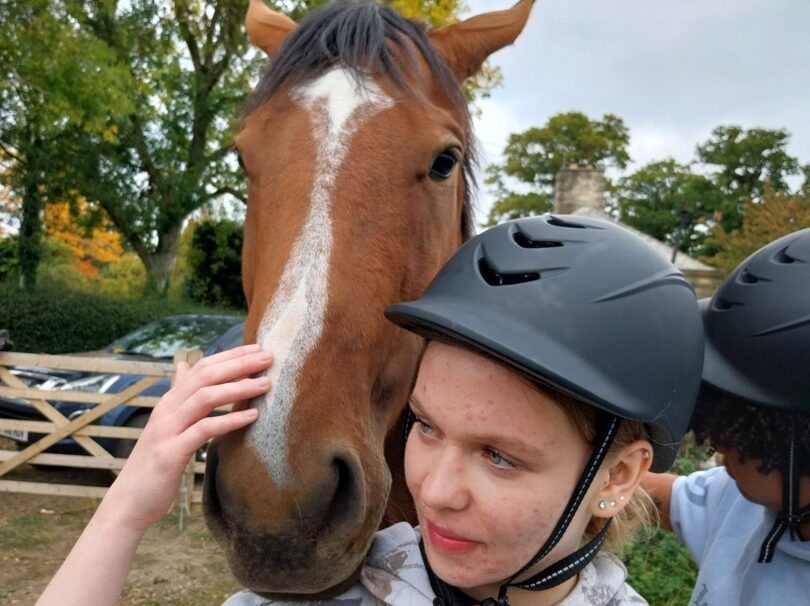
We held our first webinar on mental wellbeing in October, which you can see here. One of the speakers was Tony Searle, Principal of Hans Price Academy. In this guest blog, he has written in depth about how he has created a culture of care for pupils in his school.
This year, in collaboration with Teach First, Jamie’s Farm have set up the Cultivating Change Network, working with senior school leaders who are passionate about improving pupil behaviour and mental wellbeing in schools.
Guest blog: Creating a Culture of Care
Hans Price Academy is an 11-18 school in the coastal town of Weston super Mare serving just over 1000 pupils. The school prides itself on creating a safe, caring and inclusive environment.
“Pupils feel positive about their school experience. Staff have nurtured a welcoming, tolerant school culture where pupils respect each other and feel it is ‘OK to be different’. This is because good behaviour and the emphasis on learning enable pupils to feel safe and comfortable.” Ofsted Report 2018
Tony Searle, Principal of the Academy, has spearheaded a culture of care for staff and pupils at the school, maintaining high expectations for all pupils whilst providing bespoke support with wellbeing at its centre, including specialist internal provisions. In this guest blog, he explains how this has been achieved:
High expectations
We like to make sure that young people feel really supported at school. We like to think of this as lifting students up: rather than dropping down to meet them, we set our expectations as high as possible. Some students will meet these expectations without the need for any adult input, whilst others will need extensive support and different opportunities to get it right.
As an academy, post-pandemic we have chosen not to use the language of deficit, rather our ethos is “we’re going to get through this together, move forwards together”. Your job as a student is to worry about the task in front of you today – engaging with your teachers and the different support networks we’ve created around school – and our job is to worry about how we’ll get you to the end. Our crucial message to our students is “we can support you through this, it may be tricky at times but you’re never on your own”.
Belonging
The feeling of belonging is very important and I have done a lot of work on this alongside Sally Apps, one of the Executive Principals of the Cabot Learning Federation. In the past we have talked about trauma-informed practice, Thrive, and ACEs (Adverse Childhood Experiences), but alongside that there are also benevolent childhood experiences. It’s in creating the opportunity for benevolent childhood experiences within our academy that we can provide a counterpoint to some of those negative experiences.
It all starts in the morning. When you walk into our academy in the morning you’re greeted by a swathe of staff: support staff, members of the pastoral and admin teams. Those staff are there to make sure every student has what they need for a successful day at school. If a student doesn’t have the right shoes or they don’t have a shirt, then these will be provided for them without chastisement. Resolving some of those initial issues is really important because the uniform isn’t there to catch students out, rather it’s a fundamental part of what we do because it creates that sense of belonging. It’s not just about belonging to the academy, it’s about belonging to something bigger than yourself; seeing yourself as part of a massive team. I like to use the analogy of a sports team: you wouldn’t get Ronaldo turning up to training in his own socks because he couldn’t be bothered. He would turn up, he’d do the right thing, he’d be in his kit and if he didn’t have it, his team would make sure that he did, because you need to be part of something bigger.
Within our academy we also have a pastoral college system made up of vertical learning families from years 7 to 10. These learning families provide modelling and shared experience for students. Fostering a familial feel in our learning families is really important to forming that overarching feeling of belonging across the academy. That and the fact that as soon as you walk in the door you’re met by people who know you, care about you, want to understand you and most importantly, want to support you when you’re not getting it right.
Opportunities to experience success
We set really high expectations for conduct around school and in lessons because for us being clear, fair and consistent with young people is a form of kindness. When they get it wrong we have to be compassionate, we have to be kind, we have to be really clear and consistent with our expectations so that students know what they need to do in order to succeed. It all feeds into those benevolent childhood experiences; every single day you can walk away from school feeling like you’ve had some success in every single one of your lessons, then that feeling of success becomes a fundamental part of you.
Then there are things like sports teams, opportunities for DofE, going off to foreign climes and skiing and all those kinds of things, but it’s more than just one off events, one off interactions, it’s about an entire sense of ‘this is the way we do things here’ and part of that is about you experiencing success.
Nurturing emotional intelligence
Sometimes it can be hard for staff to be happy to see children and to give them a fresh start after difficult interactions. We try to separate the child from their behaviour and make sure we understand that this behaviour is a form of communication. Often when students behave badly, it’s generally because they’re struggling to articulate what it is that they need from you in that moment. We need to rise above that, there are professions far less stressful than ours, but if you decide you’re going to work with young people then it’s important that you recognise that children are going to have bad days. We try to calibrate our staff and make sure we talk about them being emotionally available, emotionally intelligent, emotionally literate role models for our young people.
It’s really important that we give time to cultivating that emotional intelligence, to working through different scenarios during inset days and having discussions around what happens when things go wrong. When young people are removed from their lessons and go to reflect on what went wrong and re-engage in their learning, a fundamental part of this is re-building their relationship with their teacher. This could be a one-on-one conversation if the teacher is up to it and the student is receptive, or it could be facilitated by another member of staff who has a really strong relationship with that child to make sure a constructive conversation takes place.
Staff often say that our children are “really emotionally intelligent”, but I think a better term is “hypervigilant”. If a child walks into a room and the person who is sat there rolls their eyes, shrugs or sighs before even starting a conversation, even if it’s unintentional, that person is sending a strong signal to the child. Children for whom fight, flight or freeze is an everyday state of being will pick up on this negative body language and read the situation as a threatening one. This immediately puts them on the defensive and reduces the probability of a constructive conversation. So we need to check ourselves and make sure we’re meeting all students with a smile, we need to be saying “something’s gone wrong today, but I’m still happy to see you, let’s go”, and that’s a really important part of what we do.
We will offering 10 Senior Leaders a chance to visit Tony’s school to see these strategies in practice on Wednesday 30th November. You can sign up here.



